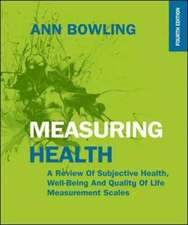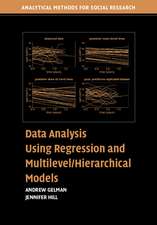Generating Data: SAGE Benchmarks in Social Research Methods
Editat de Bruce Curtis, Cate Curtisen Limba Engleză Hardback – 26 sep 2016
Volume One: Naturalistic research
Volume Two: Interrogative research and Experimental research
Volume Three: Material research and De-centred research
Volume Four: Biographic research and Secondary research
Drawing on highly influential articles from sociology, social psychology, social anthropology, and education, this is a vital collection for researchers across the social sciences.
Din seria SAGE Benchmarks in Social Research Methods
- 9%
 Preț: 4662.67 lei
Preț: 4662.67 lei - 26%
 Preț: 4278.93 lei
Preț: 4278.93 lei - 14%
 Preț: 4681.01 lei
Preț: 4681.01 lei - 14%
 Preț: 4680.92 lei
Preț: 4680.92 lei - 9%
 Preț: 4903.62 lei
Preț: 4903.62 lei - 26%
 Preț: 4717.88 lei
Preț: 4717.88 lei - 14%
 Preț: 4681.54 lei
Preț: 4681.54 lei - 14%
 Preț: 4924.58 lei
Preț: 4924.58 lei - 9%
 Preț: 4664.02 lei
Preț: 4664.02 lei - 14%
 Preț: 4680.44 lei
Preț: 4680.44 lei - 14%
 Preț: 4922.85 lei
Preț: 4922.85 lei - 26%
 Preț: 4501.58 lei
Preț: 4501.58 lei - 26%
 Preț: 4592.35 lei
Preț: 4592.35 lei - 26%
 Preț: 4279.49 lei
Preț: 4279.49 lei - 9%
 Preț: 4663.60 lei
Preț: 4663.60 lei - 11%
 Preț: 4548.15 lei
Preț: 4548.15 lei - 11%
 Preț: 4550.66 lei
Preț: 4550.66 lei - 26%
 Preț: 4499.61 lei
Preț: 4499.61 lei - 26%
 Preț: 4500.97 lei
Preț: 4500.97 lei - 26%
 Preț: 4279.73 lei
Preț: 4279.73 lei - 11%
 Preț: 4551.41 lei
Preț: 4551.41 lei - 26%
 Preț: 4717.81 lei
Preț: 4717.81 lei - 26%
 Preț: 4499.82 lei
Preț: 4499.82 lei - 11%
 Preț: 4550.81 lei
Preț: 4550.81 lei - 11%
 Preț: 5522.70 lei
Preț: 5522.70 lei - 26%
 Preț: 4280.63 lei
Preț: 4280.63 lei - 11%
 Preț: 4549.51 lei
Preț: 4549.51 lei - 26%
 Preț: 4719.83 lei
Preț: 4719.83 lei - 16%
 Preț: 4551.95 lei
Preț: 4551.95 lei - 11%
 Preț: 4553.06 lei
Preț: 4553.06 lei - 26%
 Preț: 4719.63 lei
Preț: 4719.63 lei - 26%
 Preț: 4595.76 lei
Preț: 4595.76 lei - 26%
 Preț: 4500.81 lei
Preț: 4500.81 lei - 11%
 Preț: 4551.95 lei
Preț: 4551.95 lei - 26%
 Preț: 4719.63 lei
Preț: 4719.63 lei - 11%
 Preț: 4549.05 lei
Preț: 4549.05 lei - 11%
 Preț: 4784.30 lei
Preț: 4784.30 lei - 26%
 Preț: 4279.37 lei
Preț: 4279.37 lei - 26%
 Preț: 4499.95 lei
Preț: 4499.95 lei - 26%
 Preț: 4500.36 lei
Preț: 4500.36 lei - 26%
 Preț: 4497.33 lei
Preț: 4497.33 lei - 26%
 Preț: 4278.88 lei
Preț: 4278.88 lei - 26%
 Preț: 4715.18 lei
Preț: 4715.18 lei - 26%
 Preț: 4278.67 lei
Preț: 4278.67 lei - 11%
 Preț: 4551.49 lei
Preț: 4551.49 lei - 26%
 Preț: 4279.29 lei
Preț: 4279.29 lei - 26%
 Preț: 4281.09 lei
Preț: 4281.09 lei - 26%
 Preț: 4280.71 lei
Preț: 4280.71 lei - 26%
 Preț: 4279.36 lei
Preț: 4279.36 lei
Preț: 4719.63 lei
Preț vechi: 6377.89 lei
-26% Nou
Puncte Express: 7079
Preț estimativ în valută:
903.11€ • 945.30$ • 751.67£
903.11€ • 945.30$ • 751.67£
Carte tipărită la comandă
Livrare economică 31 martie-14 aprilie
Preluare comenzi: 021 569.72.76
Specificații
ISBN-13: 9781473907829
ISBN-10: 1473907829
Pagini: 1600
Dimensiuni: 156 x 234 x 104 mm
Greutate: 3.02 kg
Ediția:Four-Volume Set
Editura: SAGE Publications
Colecția Sage Publications Ltd
Seria SAGE Benchmarks in Social Research Methods
Locul publicării:London, United Kingdom
ISBN-10: 1473907829
Pagini: 1600
Dimensiuni: 156 x 234 x 104 mm
Greutate: 3.02 kg
Ediția:Four-Volume Set
Editura: SAGE Publications
Colecția Sage Publications Ltd
Seria SAGE Benchmarks in Social Research Methods
Locul publicării:London, United Kingdom
Cuprins
VOLUME ONE: NATURALISTIC RESEARCH – FIELDWORK, PARTICIPANT-OBSERVATION, ETHNOGRAPHIC RESEARCH
How I Learned What a Crock Was - Howard S. Becker
Deep Play: Notes on the Balinese Cockfight - Clifford Geertz
On Being Sane in Insane Places - D.L. Rosenhan
Among the Thugs: The ‘New Ethnographies’ of Football Supporting Subcultures - John Hughson
Habitus as Topic and Tool: Reflections on Becoming a Prizefighter - Loïc Wacquant
‘Hidden Ethnography’: Crossing Emotional Borders in Qualitative Accounts of Young People’s Lives - Shane Blackman
Into the Dark Heart of Ethnography: The Lived Ethics and Inequality of Intimate Field Relationships - Katherine Irwin
Lumpen Abuse: The Human Cost of Righteous Neoliberalism - Philippe Bourgois
Framing Photographic Ethnography: A Case Study - Douglas Harper
Multimodal Ethnography - Bella Dicks, Bambo Soyinka and Amanda Coffey
From Policy to Prisoners to People: A ‘Soft Mixed Methods’ Approach to Studying Transgender Prisoners - Valerie Jenness
The Present of Things Past: Ethnography and Career Studies - John Van Maneen
Ethnographic Case Study (ECS): Abductive Modeling of Ethnography and Improving the Relevance in Business Marketing Research - Luca Massimiliano Visconti
VOLUME TWO: INTERROGATIVE RESEARCH AND EXPERIMENTAL RESEARCH
Part One: Interrogative Research – Grounded Theory, Focus Group, Survey Research
Role Relationships and Conceptions of Neutrality in Interviewing - Lewis Anthony Dexter
Introduction: Elite and Specialized Interviewing - Lewis Anthony Dexter
Maori and Cross-Cultural Research: Criticality, Ethicality and Generosity - Tracey McIntosh
Are There Two Methods of Grounded Theory? Demystifying the Methodological Debate - Cheri Ann Hernandez
Choosing a Methodological Path: Reflections on the Constructivist Turn - Jenna Breckenridge, Derek Jones, Ian Elliott and Margaret Nicol
Remodeling Grounded Theory - Barney Glaser and Judith Holton
Crafting and Conducting Intensive Interviews - Kathy Charmaz
The Focussed Interview and Focus Groups: Continuities and Discontinuities - Robert K. Merton
Focus Groups - David L. Morgan
Focus Group Research: Retrospect and Prospect - George Kamberelis and Greg Dimitriadis
Thirty Years of Survey Methodology/Thirty Years of BMS - Edith de Leeuw
Interviews, Surveys, and the Problem of Ecological Validity - Aaron V. Cicourel
Overreporting of Prayer in Muslim Countries: Testing the Veracity of Self-Reported Religious Practice in the Muslim World - Philip Brenner
Part Two: Experimental Research – Group Research, Remote Instrumentation
Behavioral Study of Obedience - Stanley Milgram
On the Ethics of Intervention in Human Psychological Research: With Special Reference to the Stanford Prison Experiment - Philip Zimbardo
The Effect of Video Game Violence on Physiological Desensitization to Real-Life Violence - Nicholas L. Carnagey, Craig A. Anderson and Brad J. Bushman
Cyberball: A Program for Use in Research on Interpersonal Ostracism and Acceptance - Kipling D. Williams and Blair Jarvis
Consequences of Participating in a Longitudinal Study of Marriage - Joseph Veroff, Shirley Hatchett and Elizabeth Douvan
Experimentation and Social Interventions: A Forgotten but Important History - Ann Oakley
The Growth and Development of Experimental Research in Political Science - James N. Druckman, Donald P. Green, James H. Kulinski and Arthur Lupia
The Lost Letter Technique: A Tool of Social Research - Stanley Milgram, Leon Mann and Susan Harter
You’ve Got Mail: Using E-Mail to Examine the Effect of Prejudiced Attitudes on Discrimination against Arabs - Brad J. Bushman and Angelica M. Bonacci
A Focus Theory of Normative Conduct: Recycling the Concept of Norms to Reduce Littering in Public Places - Robert B. Cialdini, Raymond R. Reno and Carl A. Kallgren
How Do I Love Thee? Let Me Count the Js: Implicit Egotism and Interpersonal Attraction - John T. Jones, Brett W. Pelham, Mauricio Carvallo and Matthew C. Mirenberg
Colliding Human–Animal Trajectories (Road Kill!) on a Tasmanian Journey - Claudia Bell
VOLUME THREE: MATERIAL RESEARCH AND DE-CENTRED RESEARCH
Part One: Material Research – Artefacts, Trace Analysis, Visual Analysis and Content Analysis
Physical Traces: Erosion and Accretion - Eugene Webb, Donald T. Campbell, Richard D. Schwartz and Lee Sechrest
Unobtrusive Measures in Organizational Theory: A Reminder - Eugene Webb and Karl E. Weick
Unobtrusive Measurement: Using Police Information for Forensic Research - Laurence J. Alison, Brent Snook and Kristin L. Stein
Smile Intensity in Photographs Predicts Longevity - Ernest L. Abel and Michael L. Kruger
The Social Archeology of a Juvenile Facility: Unobtrusive Methods in the Study of Institutional Cultures - John M. Klofas and Charles R. Cutshall
Visual Sociology Reframed: An Analytical Synthesis and Discussion of Visual Methods in Social and Cultural Research - Luc Pauwels
Content Analysis – A Methodological Primer for Gender Research - Kimberly A. Neuendorf
Types of Humor in Television and Magazine Advertising - Codruta Catanescu and Gail Tom
Hoes and Hashtags: Constructions of Gender and Race in Trending Topics - Jodi L. Rightler-McDaniels and Elizabeth M. Hendrickson
Part Two: De-centred Research – Semiotics, Discourse Analysis and Psychoanalysis
Myth Today - Roland Barthes
Letter to a Japanese Friend. (Prof. Izutsu) - Jacques Derrida
The Mirror Stage as Formative of the Function of the I as Revealed in the Psychoanalytical Experience - Jacques Lacan
Decoding Advertisements: Conclusions - Judith Williamson
Unfreezing the Truth: Knowledge and Denial in Climate Change Imagery - Judith Williamson
Mediated Intimacy and Postfeminism: A Discourse Analytic Examination of Sex and Relationships Advice in a Women’s Magazine - Rosalind Gill
The Codes of the Dead: The Semiotics of Funeral Work - Stephen R. Barley
The Narcissism of Minor Differences: The Status Anxiety and Disciplinary Intolerance between Sociology and Psychoanalysis - Siamak Movahedi
Politics and the Impossible: Beyond Psychoanalysis and Deconstruction - Glyn Daly
Never Employable Enough: The (Im)Possibility of Satisfying the Boss’s Desire - Colin Cremin
The Couch and the Chador - Siamak Movahedi and Gohar Homayounpour
VOLUME FOUR: BIOGRAPHIC RESEARCH AND SECONDARY RESEARCH
Part One: Biographic Research – Auto/Biographic Writing, Narrative Analysis, and Auto-Ethnography
Nomothetic and Idiographic Uses - Gordon Allport
‘Entering the Blogosphere’: Some Strategies for Using Blogs in Social Research - Nicholas Hookway
Narrative Configuration in Qualitative Analysis - Donald E. Polkinghorne
Positioning between Structure and Performance - Michael Bamberg
Blank Check for Biography? Openness and Ingenuity in the Management of the ‘Who-Am-I-Question’ and What Life Stories Actually May Not Be Good For - Michael Bamberg
Narrating Oneself: Reflections on the Use of Solicited Diaries with Diary Interviews - Charlotte Kenten
Another String to Our Bow: Participant Writing as Research Method - Vivienne Elizabeth
Autoethnography: An Overview - Carolyn Ellis, Tony E. Adams and Arthur P. Bochner
Analytic Autoethnography - Leon Anderson
An Autoethnography on Learning about Autoethnography - Sarah Wall
Becoming Smaller: Autobiographical Spaces of Weight Loss - Robyn Longhurst
Part Two: Secondary Research – Secondary Analysis, Documentary Research, Meta-Analysis
Secondary Analysis of Qualitative Data: An Overview - Janet Heaton
Conceptualizing Young People's Strategies of Resistance to Offending as ‘Active Resilience’ - Cathy Murray
Evidence and Proof in Documentary Research: 1: Some Specific Problems of Documentary Research - Jennifer Platt
Evidence and Proof in Documentary Research: 2: Some Shared Problems of Documentary Research - Jennifer Platt
Analysing Documentary Realities - Paul Atkinson and Amanda Coffey
Documenting the UK “Black Fish Scandal” as a Case Study of Criminal Entrepreneurship - Robert Smith
Developing Qualitative Research Streams Relating to Illegal Rural Enterprise: Reflections on Researching Qualitatively at the Margins of Entrepreneurship Research - Robert Smith and Gerard McElwee
Meta-Analysis: Recent Developments in Quantitative Methods for Literature Reviews - R. Rosenthal and M.R. Di Matteo
Meta-Analysis in Criminal Justice and Criminology: What It Is, When It's Useful, and What to Watch Out For - Travis C. Pratt
How Can Systematic Reviews Incorporate Qualitative Research? A Critical Perspective - Mary Dixon-Woods, Sheila Bonas, Andrew Booth, David R. Jones, Tina Miller, Alex J. Sutton, Rachel L. Shaw, Jonathan A. Smith and Bridget Young
How I Learned What a Crock Was - Howard S. Becker
Deep Play: Notes on the Balinese Cockfight - Clifford Geertz
On Being Sane in Insane Places - D.L. Rosenhan
Among the Thugs: The ‘New Ethnographies’ of Football Supporting Subcultures - John Hughson
Habitus as Topic and Tool: Reflections on Becoming a Prizefighter - Loïc Wacquant
‘Hidden Ethnography’: Crossing Emotional Borders in Qualitative Accounts of Young People’s Lives - Shane Blackman
Into the Dark Heart of Ethnography: The Lived Ethics and Inequality of Intimate Field Relationships - Katherine Irwin
Lumpen Abuse: The Human Cost of Righteous Neoliberalism - Philippe Bourgois
Framing Photographic Ethnography: A Case Study - Douglas Harper
Multimodal Ethnography - Bella Dicks, Bambo Soyinka and Amanda Coffey
From Policy to Prisoners to People: A ‘Soft Mixed Methods’ Approach to Studying Transgender Prisoners - Valerie Jenness
The Present of Things Past: Ethnography and Career Studies - John Van Maneen
Ethnographic Case Study (ECS): Abductive Modeling of Ethnography and Improving the Relevance in Business Marketing Research - Luca Massimiliano Visconti
VOLUME TWO: INTERROGATIVE RESEARCH AND EXPERIMENTAL RESEARCH
Part One: Interrogative Research – Grounded Theory, Focus Group, Survey Research
Role Relationships and Conceptions of Neutrality in Interviewing - Lewis Anthony Dexter
Introduction: Elite and Specialized Interviewing - Lewis Anthony Dexter
Maori and Cross-Cultural Research: Criticality, Ethicality and Generosity - Tracey McIntosh
Are There Two Methods of Grounded Theory? Demystifying the Methodological Debate - Cheri Ann Hernandez
Choosing a Methodological Path: Reflections on the Constructivist Turn - Jenna Breckenridge, Derek Jones, Ian Elliott and Margaret Nicol
Remodeling Grounded Theory - Barney Glaser and Judith Holton
Crafting and Conducting Intensive Interviews - Kathy Charmaz
The Focussed Interview and Focus Groups: Continuities and Discontinuities - Robert K. Merton
Focus Groups - David L. Morgan
Focus Group Research: Retrospect and Prospect - George Kamberelis and Greg Dimitriadis
Thirty Years of Survey Methodology/Thirty Years of BMS - Edith de Leeuw
Interviews, Surveys, and the Problem of Ecological Validity - Aaron V. Cicourel
Overreporting of Prayer in Muslim Countries: Testing the Veracity of Self-Reported Religious Practice in the Muslim World - Philip Brenner
Part Two: Experimental Research – Group Research, Remote Instrumentation
Behavioral Study of Obedience - Stanley Milgram
On the Ethics of Intervention in Human Psychological Research: With Special Reference to the Stanford Prison Experiment - Philip Zimbardo
The Effect of Video Game Violence on Physiological Desensitization to Real-Life Violence - Nicholas L. Carnagey, Craig A. Anderson and Brad J. Bushman
Cyberball: A Program for Use in Research on Interpersonal Ostracism and Acceptance - Kipling D. Williams and Blair Jarvis
Consequences of Participating in a Longitudinal Study of Marriage - Joseph Veroff, Shirley Hatchett and Elizabeth Douvan
Experimentation and Social Interventions: A Forgotten but Important History - Ann Oakley
The Growth and Development of Experimental Research in Political Science - James N. Druckman, Donald P. Green, James H. Kulinski and Arthur Lupia
The Lost Letter Technique: A Tool of Social Research - Stanley Milgram, Leon Mann and Susan Harter
You’ve Got Mail: Using E-Mail to Examine the Effect of Prejudiced Attitudes on Discrimination against Arabs - Brad J. Bushman and Angelica M. Bonacci
A Focus Theory of Normative Conduct: Recycling the Concept of Norms to Reduce Littering in Public Places - Robert B. Cialdini, Raymond R. Reno and Carl A. Kallgren
How Do I Love Thee? Let Me Count the Js: Implicit Egotism and Interpersonal Attraction - John T. Jones, Brett W. Pelham, Mauricio Carvallo and Matthew C. Mirenberg
Colliding Human–Animal Trajectories (Road Kill!) on a Tasmanian Journey - Claudia Bell
VOLUME THREE: MATERIAL RESEARCH AND DE-CENTRED RESEARCH
Part One: Material Research – Artefacts, Trace Analysis, Visual Analysis and Content Analysis
Physical Traces: Erosion and Accretion - Eugene Webb, Donald T. Campbell, Richard D. Schwartz and Lee Sechrest
Unobtrusive Measures in Organizational Theory: A Reminder - Eugene Webb and Karl E. Weick
Unobtrusive Measurement: Using Police Information for Forensic Research - Laurence J. Alison, Brent Snook and Kristin L. Stein
Smile Intensity in Photographs Predicts Longevity - Ernest L. Abel and Michael L. Kruger
The Social Archeology of a Juvenile Facility: Unobtrusive Methods in the Study of Institutional Cultures - John M. Klofas and Charles R. Cutshall
Visual Sociology Reframed: An Analytical Synthesis and Discussion of Visual Methods in Social and Cultural Research - Luc Pauwels
Content Analysis – A Methodological Primer for Gender Research - Kimberly A. Neuendorf
Types of Humor in Television and Magazine Advertising - Codruta Catanescu and Gail Tom
Hoes and Hashtags: Constructions of Gender and Race in Trending Topics - Jodi L. Rightler-McDaniels and Elizabeth M. Hendrickson
Part Two: De-centred Research – Semiotics, Discourse Analysis and Psychoanalysis
Myth Today - Roland Barthes
Letter to a Japanese Friend. (Prof. Izutsu) - Jacques Derrida
The Mirror Stage as Formative of the Function of the I as Revealed in the Psychoanalytical Experience - Jacques Lacan
Decoding Advertisements: Conclusions - Judith Williamson
Unfreezing the Truth: Knowledge and Denial in Climate Change Imagery - Judith Williamson
Mediated Intimacy and Postfeminism: A Discourse Analytic Examination of Sex and Relationships Advice in a Women’s Magazine - Rosalind Gill
The Codes of the Dead: The Semiotics of Funeral Work - Stephen R. Barley
The Narcissism of Minor Differences: The Status Anxiety and Disciplinary Intolerance between Sociology and Psychoanalysis - Siamak Movahedi
Politics and the Impossible: Beyond Psychoanalysis and Deconstruction - Glyn Daly
Never Employable Enough: The (Im)Possibility of Satisfying the Boss’s Desire - Colin Cremin
The Couch and the Chador - Siamak Movahedi and Gohar Homayounpour
VOLUME FOUR: BIOGRAPHIC RESEARCH AND SECONDARY RESEARCH
Part One: Biographic Research – Auto/Biographic Writing, Narrative Analysis, and Auto-Ethnography
Nomothetic and Idiographic Uses - Gordon Allport
‘Entering the Blogosphere’: Some Strategies for Using Blogs in Social Research - Nicholas Hookway
Narrative Configuration in Qualitative Analysis - Donald E. Polkinghorne
Positioning between Structure and Performance - Michael Bamberg
Blank Check for Biography? Openness and Ingenuity in the Management of the ‘Who-Am-I-Question’ and What Life Stories Actually May Not Be Good For - Michael Bamberg
Narrating Oneself: Reflections on the Use of Solicited Diaries with Diary Interviews - Charlotte Kenten
Another String to Our Bow: Participant Writing as Research Method - Vivienne Elizabeth
Autoethnography: An Overview - Carolyn Ellis, Tony E. Adams and Arthur P. Bochner
Analytic Autoethnography - Leon Anderson
An Autoethnography on Learning about Autoethnography - Sarah Wall
Becoming Smaller: Autobiographical Spaces of Weight Loss - Robyn Longhurst
Part Two: Secondary Research – Secondary Analysis, Documentary Research, Meta-Analysis
Secondary Analysis of Qualitative Data: An Overview - Janet Heaton
Conceptualizing Young People's Strategies of Resistance to Offending as ‘Active Resilience’ - Cathy Murray
Evidence and Proof in Documentary Research: 1: Some Specific Problems of Documentary Research - Jennifer Platt
Evidence and Proof in Documentary Research: 2: Some Shared Problems of Documentary Research - Jennifer Platt
Analysing Documentary Realities - Paul Atkinson and Amanda Coffey
Documenting the UK “Black Fish Scandal” as a Case Study of Criminal Entrepreneurship - Robert Smith
Developing Qualitative Research Streams Relating to Illegal Rural Enterprise: Reflections on Researching Qualitatively at the Margins of Entrepreneurship Research - Robert Smith and Gerard McElwee
Meta-Analysis: Recent Developments in Quantitative Methods for Literature Reviews - R. Rosenthal and M.R. Di Matteo
Meta-Analysis in Criminal Justice and Criminology: What It Is, When It's Useful, and What to Watch Out For - Travis C. Pratt
How Can Systematic Reviews Incorporate Qualitative Research? A Critical Perspective - Mary Dixon-Woods, Sheila Bonas, Andrew Booth, David R. Jones, Tina Miller, Alex J. Sutton, Rachel L. Shaw, Jonathan A. Smith and Bridget Young
Descriere
This Major Work collection explores a number of substantive methodologies and focuses on generating data, drawing primarily on literature from sociology, social psychology, social anthropology, and education.












